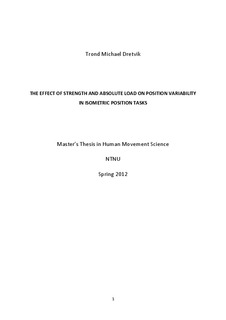| dc.contributor.advisor | Ettema, Gertjan | nb_NO |
| dc.contributor.author | Dretvik, Trond Michael | nb_NO |
| dc.date.accessioned | 2014-12-19T14:44:31Z | |
| dc.date.available | 2014-12-19T14:44:31Z | |
| dc.date.created | 2012-09-24 | nb_NO |
| dc.date.issued | 2012 | nb_NO |
| dc.identifier | 556176 | nb_NO |
| dc.identifier.uri | http://hdl.handle.net/11250/271530 | |
| dc.description.abstract | The purpose of this study was to investigate the relationship between strength and position control, with an emphasis on measurements at low, absolute levels of force, as well as to examine the effect of load on position control. 33 healthy and physically active male university students were subjected to maximum voluntary contraction (MVC) tests and a weighted positional knee extension task involving trials at force levels ranging from 0.5-20kg, with the goal of maintaining position. Among the principal findings was the fact that strength did not affect position variability at lower levels of force, while at higher force levels, the stronger subjects exhibited lower levels of position variability. Thus, it was concluded that general strength training up to a certain level is non-detrimental to force control at low levels of resistance, and that increases in strength may contribute positively to force control at moderate force levels. In accordance with previous research, variability increased as a function of load, while variability relative to load decreased with added weight. At the heaviest weights, strength became the main determinant of performance, while its importance at lower force levels was negligible. Mean and maximum frequency of velocity and acceleration exhibited a U-shaped relationship with weight, which at the lower end was attributed in part to an inability to perceive and correct for the small force oscillations, as well as low inertia. | nb_NO |
| dc.language | eng | nb_NO |
| dc.publisher | Norges teknisk-naturvitenskapelige universitet, Fakultet for samfunnsvitenskap og teknologiledelse, Institutt for bevegelsesvitenskap | nb_NO |
| dc.subject | Social and Behavioural Science, Law | en_GB |
| dc.title | The effect of strength and absolute load on position variability in isometric position tasks | nb_NO |
| dc.type | Master thesis | nb_NO |
| dc.contributor.department | Norges teknisk-naturvitenskapelige universitet, Fakultet for samfunnsvitenskap og teknologiledelse, Institutt for bevegelsesvitenskap | nb_NO |
